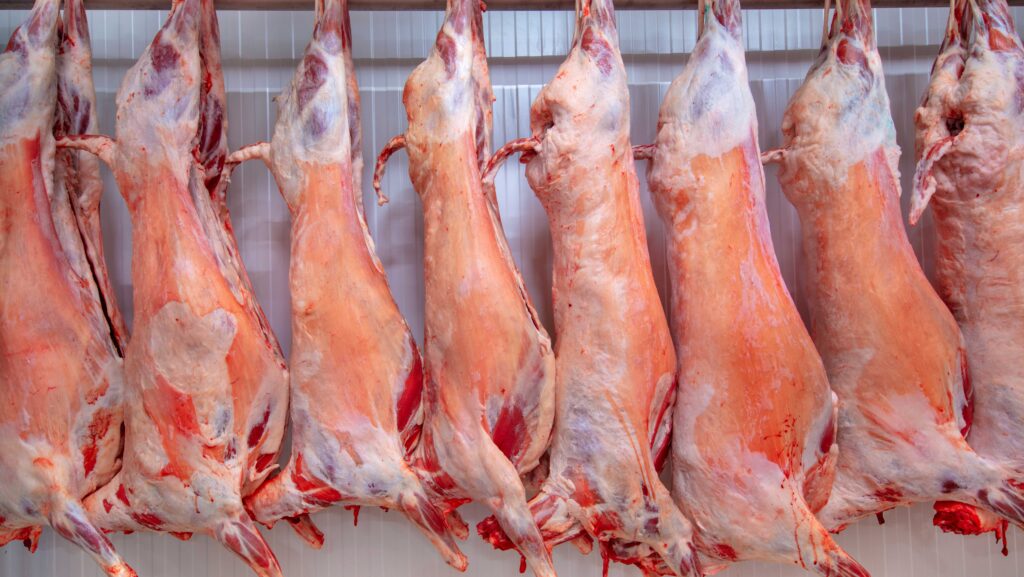Dismay as abattoirs cut lamb prices in bluetongue (BTV) restriction zone
 © Adobe Stock
© Adobe Stock Sheep farmers have reacted in dismay at lower prices being offered by abattoirs for lambs from within the bluetongue (BTV) restriction zone.
Price cuts of up to 50p/kg have been imposed by some sites looking to cover the additional costs associated with the disease.
National Sheep Association chief executive Phil Stocker called the move by abattoirs “really disappointing”.
He added that farmers in the zones were being hit hard enough and the last thing they wanted was to feel that they were being penalised or discriminated against in the marketplace.
See also: FSA sheep slaughter survey shows high hygiene levels
“There are abattoirs that have been under pressure for the past two years, while farmstock prices have been really high, so some abattoirs are looking for opportunities to knock prices down a bit,” he said.
Mr Stocker acknowledged that abattoirs were encountering additional costs, with controls and restrictions on when they can kill, as well as cleaning down procedures.
But he said It was about the industry working together and “not taking advantage of each other.”
The bluetongue restriction zone covers the majority of the east of England and has been expanded to include parts of Leicestershire, Northamptonshire and Buckinghamshire.
Additional cost
Farmers Fresh, which processes more than one million sheep a year between its two sites, has confirmed a 30p/kg price cut for lambs from bluetongue zones.
A spokesperson for Farmers Fresh told Farmers Weekly the decision was driven by the additional costs of disinfecting the site, vehicles, and waste products, as well as having to clean all the lairage down between varying loads of stock.
He said they had been processing lambs from BTV-free areas in the mornings before cleaning down the site and then moving to stock from inside the restriction zone.
He added that even if the site only process 100 animals from a BTV zone, it still had high overhead costs.
Farmers Fresh offered a base price of 610p/kg deadweight in the last week and typically pays for more weight than some of its competitors, as it doesn’t strip out kidney fat.
Animal and Plant Health Agency (Apha) guidance states that animals from restricted zones must arrive and be slaughtered at least one hour after sunrise and two hours before sunset to avoid the times of peak vector activity.
This creates a tightening window for abattoirs as sunlight hours decrease.
British Meat Processors Association chief executive Nick Allen said there is undoubtedly a cost for abattoirs as a result of bluetongue.
“Some abattoirs are absorbing that cost, and others are factoring it into prices. I suspect it comes down to the size of abattoir and how much they have been disrupted by it,” said Mr Allen.
He added: “There is still a shortage of lambs out there and the market will prevail.”
Market prices
Trade at livestock markets has also been affected with some markets within the BTV zones seeing less buyers around the ring as a result the restrictions.
High farmgate lamb prices during the first half of 2024 have reportedly left some abattoirs making a loss in excess of £100,000 a month.
Overall, GB finished deadweight lamb prices remain above last year’s levels and averaged 624p/kg for the week ending 5 October.
Case study: Melton Meat, Leicestershire
Mark Gale, director at processor Melton Meat in Leicestershire, said procurement due to bluetongue was very difficult for about a week until the Restriction Zone was extended to include his abattoir.
“Half my stock came from east of the A1, and suddenly I was having to try and source lambs from west of the A1,” said Mr Gale.
Losing private killing jobs for butcher shops was “detrimental”, but Mr Gale said this was only temporary, and now the fact his farm abattoir is in the BTV zone has made life easier.
He added that, because his site is a farm abattoir and does not kill every day of the week, the 24-hour BTV rule was detrimental to his practice of holding lambs over for two or three days.
“They are necessary, but unfortunately bluetongue restrictions bring more headaches and hassle for the abattoir industry which is already struggling with paperwork and compliance.”
